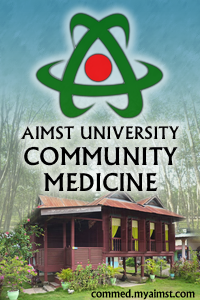Some background information regarding medical assistants (MA)
- Multi skilled, multifunctional healthcare providers for more than 100 years.
- Initially known as " dressers ".
- Often called the " backbone " of rural health services and ‘jack of all trades’ in hospitals.
- Male nurse profession introduced in mid-50s
- In 1977, Hospital Assistants (Registration) Board established under "Act 180".
- In 1992, nomenclature of "hospital assistants" changed to "medical assistants ". Training upgraded to diploma level.
- The Board functions under Medical Practices Division. DG of Health is the Chairman. Chief Medical Assistant is the Secretary of the Board.
Role of PPP (Medical Assistants)
Responsible in the promotion, prevention, curative and rehabilitation of community under the inspection of medical officer in the primary health care set-up.
Assisting family medicine specialist and medical officer in term of clinical settings, documentation, medical training, management of health care and research.
Head a primary health care clinic during the absence of medical officer.
Their works includes:
- Screening of patient
- History-taking.
- Vital signs examination.
- Physical examination.
- Lab investigation or X-ray ( whenever necessary)
- Examination, diagnosis and treatment
- Carrying out certain diagnostic and therapeutic procedures, such as ECG, nebulization, IV infusion.
- Carrying out certain minor procedure, namely application of POP, I&D and so on.
- Giving injection.
- Taking IV blood sample.
- Emergency treatment
- Involve in preliminary management during emergency.
- Conduct First Aids and CPR.
- Referral of cases to medical officer / nearest health centre.
- Referral
- Refer cases which are not within their limit to hospital.
- Handling referral cases from paramedics.
- Receiving follow-up of stable cases from the hospital.
- In time of emergency, a medical assistant is allowed to drive the ambulance, provided that there was a written order from medical officer.
- Ambulance service
- Head the ambulance team.
- Responsible to ensure that all the equipments in the ambulance are in good condition.
- Health education and counseling
- Responsible for counseling the patients and community.
- Involve in health campaign.
- Treatment of communicable diseases
- Case tracing.
- Case notification.
- Contact tracing.
- Provide treatment.
- Give immunization injections when needed.
- Home visits to defaulters and to give health education.
- Treatment of non-communicable diseases
- Screening and detection.
- Initiate treatment.
- Follow-up for stable cases.
- Give counseling and health education.
- Immunization
- Examination and injection of Anti-Typhoid jab to food handler.
- ATT injection.
- Meningococcal injection to those going to perform Hajj.
- Japanese encephalitis vaccination
- Cholera injection.
- After working hours
- Attend to emergency cases after working hours.
- As assistant pharmacists
- Medication dispensing.
- Packing medicine.
- Recording medicine usage.
By [Michelle] Huang Mooi Sia, 0400474, FMHS Batch 5/6, Source from aimstdho.blogspot.com


